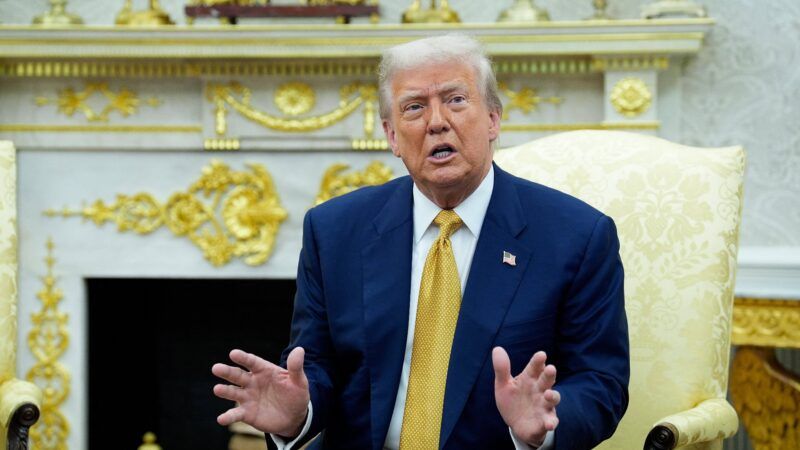After Another Delay, Trump's China Tariffs Look Even Less Like a Legitimate 'Emergency'
The words national emergency are not a magic spell that presidents can utter to unlock unlimited legislative powers for themselves.

To place huge new tariffs on imports from China, President Donald Trump claimed that those transactions are "an unusual and extraordinary threat" to the United States.
It's a threat that the White House now says it can put off addressing for another 90 days.
On Monday, Trump again postponed the enforcement of his threatened 30 percent tariffs on imports from China, which were set to resume on Tuesday after being previously postponed in May. In a new executive order, Trump said the United States "continues to have discussions" with China "to address the lack of trade reciprocity in our economic relationship and our resulting national and economic security concerns."
Elsewhere in the same executive order, Trump reiterated the claim that trade with China poses "an unusual and extraordinary threat to the national security" of the country.
The idea that mutually beneficial trade between people or businesses in different countries is some sort of national security threat is nonsense, of course. But, even if you accept Trump's premise that trade with China is an urgent threat requiring extraordinary executive powers, then how can it be acceptable to wait three more months before applying the president's chosen remedy?
This is not just a rhetorical point but a question that's central to the legality of the tariffs. In front of the U.S. Court of Appeals for the Federal Circuit last month, the Trump administration's lawyer told skeptical judges that the president's tariff powers rested upon the existence of an "unusual threat" that the president was taking action to "deal with."
The latest delay in the China tariffs, then, seems to directly undermine that claim. If Trump wants to use the threat of tariffs to negotiate a new trade deal with China, fine, but then that's not an emergency—and, as a result, those tariffs cannot be implemented with the emergency powers the president is currently claiming.
Of course, the delay is good news in the sense that it means three more months will pass before Americans will have to pay those import taxes—though the move does create additional uncertainty for any business that buys goods, parts, or raw materials from China. It also allows more time for the world's two largest economies to reach a deal that will give Trump an off-ramp from this self-destructive trade war. Hopefully he finds one.
The words national emergency are not a magic spell that presidents can utter to unlock unlimited legislative powers for themselves. If Trump wants to impose sweeping tariffs on imports from China and the rest of the globe, he should have to go through the proper steps to do so—which means going to Congress and getting those taxes passed into law.
Until that happens, every court should reject this "national emergency" as the obvious nonsense that it is.


Show Comments (36)